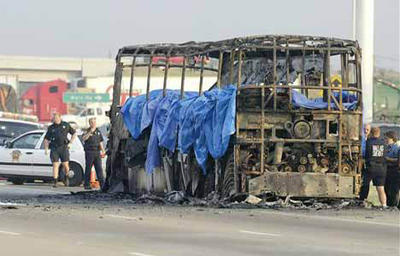 |
Saturday, September 24, 2005
"Well because of that pistol we took their two young men ... Their mother is at my feet trying to kiss my feet like I deserve my feet to be kissed."
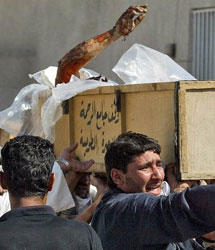
'You Can't Wash Your
Hands When They're
Covered in Blood'
By Hart Viges
The Independent UK
Go to Original
Saturday 24 September 2005
My name is Hart Viges. September 11 happened. Next day I was in the recruiting office. I thought that was the way I could make a difference in the world for the better.
So I went to infantry school and jump school and I arrived with my unit of the 82nd Airborne Division. I was deployed to Kuwait in February 2003. We drove into Iraq because Third Infantry Division was ahead of schedule, and so I didn't need to jump into Baghdad airport.
As we drove into Samawa to secure their supplies my mortar platoon dropped numerous rounds on this town. I watched Kiowa attack helicopters fire Hellfire missile after Hellfire missile. I saw a C130 Spectre gunship ... it will level a town. It had belt-fed artillery rounds pounding with these super-Gatling guns.
I don't know how many innocents I killed with my mortar rounds. I have my imagination to pick at for that one. But I clearly remember the call-out over the radio saying "Green light on all taxi-cabs. The enemy is using them for transportation".
One of our snipers called back on the radio saying "Excuse me but did I hear that order correctly? Green light on all taxi cabs?" "Roger that soldier. You'd better start buckling up." All of a sudden the city just blew up. Didn't matter if there was an innocent in the taxi-cab - we laid a mortar round on it, snipers opened up.
Next was Fallujah. We went in without a shot. But Charlie Company decided they were going to take over a school for the area of operations. Protesters would come saying "Please get out of our school. Our children need this school. We need education".
They turned them down. They came back, about 40 to 50 people. Some have the bright idea of shooting AK-47s up in the air. Well a couple of rounds fell into the school ... They laid waste to that group of people.
Then we went to Baghdad. And I had days that I don't want to remember. I try to forget. Days where we'd take contractors out to a water treatment plant outside of Baghdad.
We'd catched word that this is a kind of a scary place but when I arrive there's grass and palm trees, a river. It's the first beautiful place that seemed untouched by the war in Iraq. As we leave, RPGs come flying at us. Two men with RPGs ran up in front of us from across the road.
"Drop your weapons". "Irmie salahak." They're grabbing on to women and kids so [we] don't fire. I can't take any more and swing my [gun] over. My sight's on his chest, my finger's on the trigger. And I'm trained to kill but this is no bogey man, this is no enemy. This is a human being. With the same fears and doubts and worries. The same messed-up situation.
I don't pull the trigger this time ... it throws me off. It's like they didn't tell me about this emotional attachment to killing. They tried to numb me, they tried to strip my humanity. They tried to tell me that's not a human being - that's a soft target.
So now, my imagination is running ... What if he pulled his trigger? How many American soldiers or Iraqi police, how many families destroyed because I didn't pull my trigger. After we leave this little village we get attack helicopters, Apaches, two Bradley fighting vehicles, and we go back. And we start asking questions. Where are they? Eventually they lead us to this hut where this family is living, and myself and [another soldier] started searching for AK-47s, for explosives, for RPGs, you know ... evidence. And all I can find is a tiny little pistol, probably to scare off thieves
Well because of that pistol we took their two young men ... Their mother is at my feet trying to kiss my feet like I deserve my feet to be kissed. Screaming, pleading. I don't need to speak Arabic to know love and concern and fear. I had my attack helicopter behind me, my Bradley fighting vehicle, my armour, my M4 [semi-automatic] with laser sight. I'm an 82nd Airborne killer. But I was powerless ... to ease this woman's pain.
After I came home I applied for conscientious objector [status]. I'm a Christian, what was I doing holding a gun to another human being? Love thy neighbour. Pray for those who persecute you, don't shoot them.
I get my conscientious objector packet approved. I'm free. It's all gone now, right? No! I still swerve at trash bags ... fireworks ... I can't express anything. All my relationships are falling apart because they can't fucking understand me. How do they know the pain I've gone through or the sights I've seen? The innocence gone, stripped, dead? I couldn't stand the pain. People were leaving me.
I couldn't cut my wrists. So I called the police. They come stomping through my door. I have my knife in my hand. "Shoot me." All of a sudden I was the man with the RPG, with all the guns pointed at him, thinking "Yes, we can solve the world's problems by killing each other". How insane is that? Lucky I lived through that episode. See, you can't wash your hands when they're covered in blood. The wounds carry on. This is what war does to your soul, to your humanity, to your family.
WOW HELL YEAH, THANK YOU AMERICA, HOW I WISH I COULD HAVE BEEN THERE BUT I WAS IN SPIRIT I ASSURE YOU
Cindy seemed choked up as well... here is the prepared speech.. the one she didn't give..
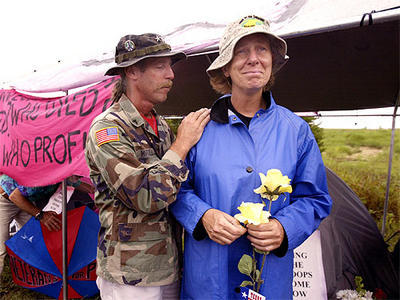
My Speech
by CindySheehan
Sat Sep 24th, 2005 at 05:56:19 PDT
September 24
UFPJ Rally
Ahhhh, I love the smell of Patriotic Dissent in the afternoon!
CindySheehan's diary :: ::
As we stand here on the grounds of a monument that is dedicated to the Father of our Country, George Washington, we are reminded that he was well known for the apocryphal stories of never being able to tell a lie. I find it so ironic that there is another man here named George who stays in this town between vacations and he seems to never be able to tell the truth. It is tragic for us that o ur bookend presidents named George have two completely different relationships with honesty.
I also find it ironic and heartbreaking that my son, Casey
 , who was a brave person, tall and proud, who loved his country and was honest beyond measure, could be sent to his death by someone who is even too cowardly to meet with a broken hearted mom, let alone go and fight in the illegal and immoral war of his generation. We are losing our best and our brightest in a country that we are destroying that was no threat to the United States of America. Iraq was and still is no danger to our safety and security, or to our way of life. The weapons of mass destruction and mass deception reside in this town: they are the neocons who pull the strings and the members of Congress who have loosened the purse strings with reckless abandon and have practically given George and company a blank check to run our country into monetary and moral bankruptcy. We are out here in force today to take our country back and restore true democracy and sanity to our political process. The time is now and we are here because we love our country and we won't let the reckless maniacs destroy her any further.
, who was a brave person, tall and proud, who loved his country and was honest beyond measure, could be sent to his death by someone who is even too cowardly to meet with a broken hearted mom, let alone go and fight in the illegal and immoral war of his generation. We are losing our best and our brightest in a country that we are destroying that was no threat to the United States of America. Iraq was and still is no danger to our safety and security, or to our way of life. The weapons of mass destruction and mass deception reside in this town: they are the neocons who pull the strings and the members of Congress who have loosened the purse strings with reckless abandon and have practically given George and company a blank check to run our country into monetary and moral bankruptcy. We are out here in force today to take our country back and restore true democracy and sanity to our political process. The time is now and we are here because we love our country and we won't let the reckless maniacs destroy her any further.We as a young colony of Great Britain broke from another tyrant, King George the Third. Well, I wish our George the Third were here today to see us out here in force protesting against his war and against his murderous policies. George is not here, though, because he is out galavanting around the country somewhere pretending that he cares about the people who are in the path of hurricane Rita. We know that he cares nothing for the people of America: Katrina, Iraq, and his idiotic response to 9/11 are evidence of that. He is just out and about play-acting like a President whose country is in crisis just like he pretends to be a Commander in Chief and a Cowboy (I wonder if before he took off to Texas or Colorado or wherever he went, he watched a movie like Independence Day to see how that other fake president acted?). The reason he is out today is that his handlers told him that he got a little flak for playing golf and eating birthday cake with Senator Me Cain while some of his employers were hanging off rooftops and treetops in New Orleans. He swaggers around arrogantly like he is a macho dictatorial tyrant who doesn't have to answer to his employers, the people of the United States of America. Those days are over George, we are here today to tell you that we are a majority and we will never rest until you bring our young people home from the Middle East and until you start putting money into rebuilding OUR communities: the ones natural disasters destroy with your help, and the ones which your callous and racist war economy are decimating. We won't allow you to take anymore money out of social programs to finance Halliburton to rebuild the Gulf States: there is no money. Our bank account is empty. George, this is our rainy day and you have failed us miserably. Stop pouring money into the pockets of the war profiteers and into building permanent bases in Iraq . It is time to bring our billions of dollars home from Iraq too!!!
One thing the Camp Casey movement that hunkered down in Crawford, Texas this past August taught us is that we the people of America have the power and we can and should name our national policy and make sure it is carried out. I constantly get asked if we are making a difference and if we think (like we're naïve boobs) that we will actually stop the war. Well, looking back at how Vietnam was ended and looking back in the history of our country, most notably in the suffragette, union, and civil rights movements, we the people are the only ones who have been able to transform history and affect true and lasting change here in America: so to those people who question if we are making a difference: I tell them to go back to school and read their history books!! And another thing these questioners overlook is that WE ARE MAKING A DIFFERENCE!!! And we are here to tell the media, Congress, and this criminal and criminally negligent administration: WE ARE NOT GOING AWAY!!!
We in the peace movement need to agree on one thing: yes we need an exit plan, but it is not a strategy, it is a command. The command should be: have all of our military personnel and paid killer mercenaries out of Iraq within 6 months and the generals carry out the command. Simple, it's not brain surgery and I think it is so easy even George Bush can sign the order. We can't give the homicidal maniacs any wiggle room or long term strategy sessions. For one thing, when our leaders strategize, we are put in even more jeopardy, they have proven that they are not too bright or even a little compassionate. But the most important thing is that people die everyday in Iraq for absolutely no reason and for lies. We have to say NOW because the people on the other side are saying NEVER. We can't compromise, we can't say please, and we can't retreat. If we do, our country is doomed. We have to honor the sacrifices of our loved ones by completing the mission of peace and justice. It is time. Bring our troops home, NOW!.
Link Here
LOOK AT THE PHOTOS OF THE CROWDS AT THE ANTI-WAR PROTESTS. COUNT THEIR NUMBERS. SEE WITH YOUR OWN EYES THE MEDIA LIE OF POPULAR SUPPORT FOR THE INVASI
I sat up all night to see the protest march on C Span and all they showed was the speeches, quite honestly that sucks big time as far as I am concerned.
Thank you whatreallyhappened.com for giving us the truth you rock big time check it out it makes me proud http://www.whatreallyhappened.com/protestphotos.html
DC PROTEST SEEN FROM THE TOP OF THE WASHINGTON MONUMENT!

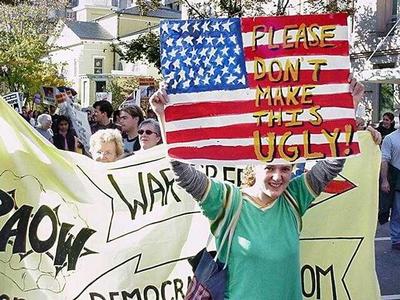
WASHINGTON
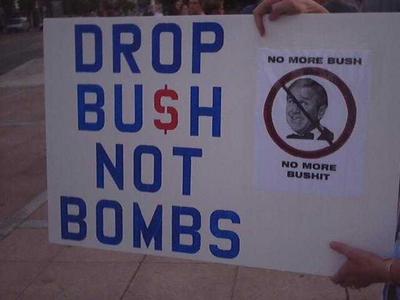
OHIO

SAN FRANCISCO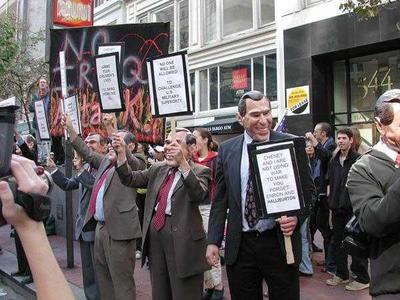

HAWAII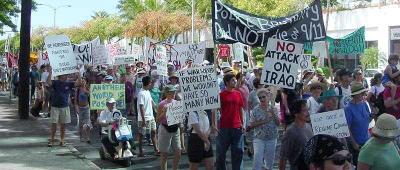

HELL YEAH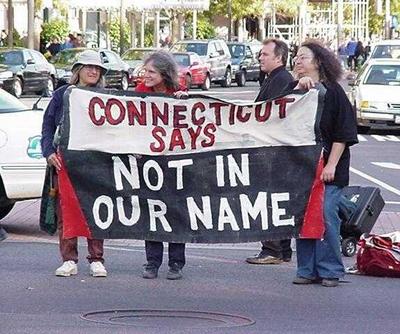
YES YES CONNECTICUT

Thank you whatreallyhappened.com for giving us the truth you rock big time check it out it makes me proud http://www.whatreallyhappened.com/protestphotos.html
DC PROTEST SEEN FROM THE TOP OF THE WASHINGTON MONUMENT!



WASHINGTON

OHIO


SAN FRANCISCO


HAWAII


HELL YEAH

YES YES CONNECTICUT

Huge Anti- Bush March In DC, 600,000 Strong.

MASSIVE
Ongoing updates here
Cops
By William Rivers Pitt
Saturday 24 September 2005 2:31 PM
I just overheard ten cops getting new orders to move barricades and open the streets further. They are scrambling to control the size of this thing.
The march has finally begun again, and a light rain is falling.
--------------------------------------------------------------------------------
Holy Crap
By William Rivers Pitt
Saturday 24 September 2005 2:23 PM
CNN is estimating the crowd here to be more than six hundred thousand strong.
If CNN says it, it must be true.
Wow.
--------------------------------------------------------------------------------
Restless
By William Rivers Pitt
Saturday 24 September 2005 2:14 PM
The crowd is getting restless. They want to march. I cannot find the front of the thing. It is splayed in all directions.
Jessica Lange is speaking from the stage, but I can't hear her because of the helicopter overhead.
--------------------------------------------------------------------------------
Mammoth
By Scott Galindez
Saturday 24 September 2005 1:54 PM
Huge is an understatement. The march has surrounded the White House. Hundreds of thousands. This is the largest march I have seen in the over two decades that I have been attending.
The crowd is diverse, a true cross-section of American culture.
--------------------------------------------------------------------------------
Too Big
By William Rivers Pitt
Saturday 24 September 2005 1:46 PM
The march is unable to move because there are so many people coming in from all directions. Constitution Avenue is a wall of humanity. I am up on the hill that holds the Washington Monument, looking down on the crowd. This is a massive, massive showing.
Hot damn.
See our sidebar link list for LIVE CHAT...
I am there now as are several
marchers in DC.
7 wedding singers shot dead
23/09/2005 23:42
Mazar-i-Sharif - A band of seven wedding singers was shot and killed on their way home from a late night performance in northern Afghanistan, said police on Friday.
Mohammed Azam of the police said the men were ambushed as they were returning to Mazar-i-Sharif, the capital city of northern Balkh province, after a show in Chimtal district.
Azam said: "Unknown armed men ambushed their vehicle and fired at them and killed them.
"It doesn't seem the attackers were thieves because they did not steal anything, not even the car."
He said: "They might be personal enemies of the seven or some extremist group, but it is premature to tell."
Sparsely populated Balkh was usually free of the Taliban-linked violence that plagued southern Afghanistan, but was home to various rival warlords.
The fundamentalist Taliban outlawed several Afghan traditions after they took power in 1996, including hiring performers to sing and play traditional instruments at weddings, parties and other functions.
The custom made a strong comeback almost immediately after the Taliban were toppled in a United States-led campaign launched in late 2001 after the hardliners refused to hand over Osama bin Laden for the September 11 attacks.
Link Here
Mazar-i-Sharif - A band of seven wedding singers was shot and killed on their way home from a late night performance in northern Afghanistan, said police on Friday.
Mohammed Azam of the police said the men were ambushed as they were returning to Mazar-i-Sharif, the capital city of northern Balkh province, after a show in Chimtal district.
Azam said: "Unknown armed men ambushed their vehicle and fired at them and killed them.
"It doesn't seem the attackers were thieves because they did not steal anything, not even the car."
He said: "They might be personal enemies of the seven or some extremist group, but it is premature to tell."
Sparsely populated Balkh was usually free of the Taliban-linked violence that plagued southern Afghanistan, but was home to various rival warlords.
The fundamentalist Taliban outlawed several Afghan traditions after they took power in 1996, including hiring performers to sing and play traditional instruments at weddings, parties and other functions.
The custom made a strong comeback almost immediately after the Taliban were toppled in a United States-led campaign launched in late 2001 after the hardliners refused to hand over Osama bin Laden for the September 11 attacks.
Link Here
Tens of thousands set to march against Iraq war

Last Update: Saturday, September 24, 2005. 9:09pm (AEST)
Tens of thousands of people were expected to march in central London on Saturday calling for an end to the US-led war in Iraq and for the return of British troops from the country.
London's protest rally is being held to coincide with similar marches in Washington, Rome, Paris, Copenhagen, Oslo and Helsinki.
The Stop The War coalition, which organised the London rally jointly with the Campaign for Nuclear Disarmament and the Muslim Association of Britain, said it expected at least 100,000 people to take part.
"Today coincides with the demonstration in Washington DC and is also the eve of the Labour Party annual conference," which Prime Minister Tony Blair will attend in the southern city of Brighton, Stop the War spokesman Viven Lehal said.
The demonstrators were due to set off from the Houses of Parliament at around noon, arriving at Hyde Park two hours later where the rally was to continue.
British anti-war campaigners have been calling for the return of the 8,500 British troops deployed as part of the US-led forces in Iraq.
"We want to withdraw the troops from Iraq. Clearly what happened in Basra this week shows that British troops aren't helping there, they make the situation worse," Viven Lehal said.
The past week saw an upsurge of tensions around the southern Iraqi city of Basra, where many of Britain's troops in the country are based.
British troops stormed an Iraqi police station after two British undercover soldiers were arrested by the police and then kidnapped by a Shiite militia.
Authorities in Basra have been refusing to engage with British troops following the incident.
Saturday's protest was also called in protest at counter-terrorism measures proposed by the government in the wake of the London bombings in July, and perceived by critics as a threat to civil liberties - and to mark concern at a sharp rise in racist incidents in the wake of the bombings, Lehal said.
-AFP
Link Here
War protests make for strange bedfellows Liberal groups set aside their differencesover Israel-Palestinian issues for D.C. rally

Joe Garofoli, Chronicle Staff Writer
Friday, September 23, 2005
The only time 65-year-old Sally Johnson attended a political rally was in San Francisco after the recount of the 2000 presidential election was halted. The Walnut Creek grandmother couldn't understand why all "these crackpots" were there, "talking about all sorts of things" other than the recount.
Johnson expects a few "crackpots" will be in Walnut Creek on Saturday, when upward of 400 people are expected to attend the city's largest anti-war demonstration ever. It coincides with what's expected to be the largest peace rally in Washington, D.C., since the U.S. invasion of Iraq more than two years ago.
Johnson's puzzlement about the composition of street protests is registering with national anti-war leaders, who are trying to deal with one of the questions they've heard from both moderate suburbanites and conservative critics:
Is the movement too far left?
Organizers expect more than 100,000 people to gather Saturday on the grounds of the Washington Monument, the centerpiece of a three-day weekend of anti-war events that will include interfaith services Sunday, and civil disobedience acts and congressional lobbying Monday. Demonstrations also are scheduled Saturday in San Francisco and several other cities nationwide.
However, the collective support for the anti-war message on the left is laden with disclaimers about how the disparate groups backing the effort don't necessarily agree with each other on issues other than Iraq.
With a formality unusual for the anti-war movement, the two main groups organizing Saturday's demonstration have signed a three-page agreement covering everything from who will hold the lead parade banner to how big protesters' placards can be (3 feet by 3 1/2 feet).
In a reference to past political differences, mainly over the relationship between Israel and the Palestinians, the pact signed by International ANSWER and United for Peace and Justice also says, "Between now and the end of the demonstration on Sept. 24, each coalition agrees not to attack the other coalition."
Some of the 1,200 religious and community groups under the United for Peace and Justice umbrella have expressed discomfort with International ANSWER's critiques of Israel. Moderates in the anti-war movement -- and right-wing commentators including Rush Limbaugh -- talk about the group's origins with socialist Workers World Party and how International ANSWER members have defended Saddam Hussein's regime in Iraq and Kim Jong Il of North Korea.
International ANSWER's defenders say the charges are little more than red-baiting and an attempt to discredit the organization that coordinated anti-war street demonstrations for months before the March 2003 invasion.
The group's Richard Becker downplayed political differences among International ANSWER's cohorts on the left, saying, "That's behind us now." United for Peace spokesman Bill Dobbs agreed, saying the demonstration protocols don't matter to anybody outside the media.
But others say the qualifiers are partially a response to conservative critics, who have long said the anti-war movement is led by far-left forces out of touch with moderate Americans.
Last month, critics tried to discredit Cindy Sheehan, the Vacaville activist who camped outside President Bush's vacation ranch in a vain attempt to meet with him, by citing her affiliations with activist organizations such as Code Pink. Members of the group led disruptions of the 2004 Republican National Convention in New York, and the conservative Web site FreeRepublic.com blasted their recent vigil outside Walter Reed Army Medical Hospital in Washington, D.C., as an attempt "to manipulate wounded soldiers." Code Pink said it was trying to get more aid for returning soldiers from Iraq and Afghanistan.
Criticisms of activists' associations are rooted in a fundamental red and blue political divide: Liberal-led demonstrations often are filled with supporters advocating a variety of causes in an effort to show how the issues are interrelated. That's why International ANSWER insisted on ground rules for Saturday's demonstration allowing signage linking the Iraq war to "the colonial occupation of Palestine, the occupation of Haiti and other anti-imperialist positions."
United for Peace will focus its signage solely on the war.
Conservatives insist that by participating in such a demonstration, marchers endorse the views of those next to them.
"People should be careful of the company they keep in these marches," said Kristinn Taylor, an organizer with FreeRepublic.com. "The question I always ask is, 'If the Klu Klux Klan led an anti-war demonstration, would you march in it?' "
Other political disclaimers are aimed at bringing more moderate Americans into the streets Saturday, including new people inspired by Sheehan's ranch vigil.
MoveOn.org, an Internet-based liberal group that rarely gets involved in street protests, decided to endorse this one in a message to its 3.5 million members after Sheehan's protest energized the anti-war movement.
But MoveOn qualified its support by noting that it had "disagreements on a range of issues" with some of Saturday's organizers.
"There's a feeling among some of our members that some of the more vocal people at these rallies are part of the far left and not representative of most Americans," said Tom Matzzie, director of MoveOn.org Political Action, who would not be more specific. "But this is such an important moment in history that we wanted to support the events."
Rabbi Michael Lerner, editor of the Berkeley-based Tikkun magazine and one of the scheduled speakers at an interfaith service in Washington on Sunday, was more pointed.
"Support for the anti-war message is so important," Lerner wrote in an e-mail to supporters recently, "that we are willing to participate in a demonstration with others whose views we find obnoxious."
Lerner was referring to International ANSWER. In the e-mail, Lerner said the group's criticisms of Israel have "an anti-Semitic tinge."
Becker called such accusations "garbage."
"We are against racism in all forms," he said. "And Lerner contributes nothing but criticism of the people who are leading the anti-war movement."
At Sunday's service, Lerner plans to urge the anti-war movement -- of which he has been a part for four decades -- "to switch from telling people what it is against to telling them what it is for."
Lerner's alternative: Instead of just calling for an immediate U.S. troop pullout that could leave Iraq vulnerable, activists should advocate for international support in the region. He suggests that the United States and other countries lead a "global Marshall Plan" to eliminate poverty worldwide.
But Melanie Morgan, the conservative San Francisco talk show host whose Move America Forward is coordinating a conservative countermarch Sunday on the Mall in Washington, was dubious about the left's articulating a positive message.
"Red state America doesn't understand what these people are talking about and doesn't want to," Morgan said.
While red and blue forces swap venom in Washington, Sally Johnson will be in Walnut Creek, where public opinion on the war is more subdued. For now.
After attending a vigil supporting Sheehan with 400 others in a park in Pleasant Hill last month, Johnson said she had concluded that "people are mad about things now. And now they feel that enough people are speaking out that I don't have to feel like I'm the only one."
Link Here
Bush 'greater threat than bin Laden'
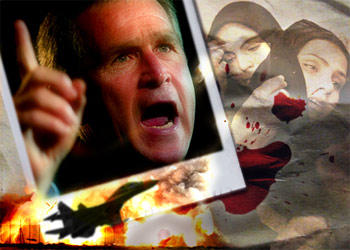
September 24, 2005
A PANEL reporting to the US State Department has warned that US President George W. Bush is seen in some Arab nations as a greater threat than al-Qaeda founder Osama bin Laden, a US newspaper reported today.
The report by the congressionally mandated advisory panel, which found that "America's image and reputation abroad could hardly be worse", has been seen by senior officials but not yet released publicly, The Washington Post said.
A fact-finding mission to the Middle East last year found that "there is deep and abiding anger toward US policies and actions", according to The Post.
The Advisory Committee on Cultural Diplomacy cited polls that found that large majorities in Egypt, Morocco and Saudi Arabia "view George W. Bush as a greater threat to the world order than Osama bin Laden".
Undersecretary of State for Public Diplomacy Karen Hughes, a longtime presidential adviser, prepares to leave this weekend on a "listening tour" of the Middle East.
The panel's report warns that televised images of US policy choices - such as in the Israeli-Palestinian conflict and the invasion of Iraq - reverberate across the Arab media and will "long haunt the image of the United States", the paper said.
The committee recommended a series of steps, including increased funding and staffing, to rebuild efforts to promote US culture and ideas - an essential task that it said has been eroded through bureaucratic shuffling and indifference.
In much of the world, the report said, the United States is viewed as "less a beacon of hope than a dangerous force to be countered", according to The Post.
The advisory committee was created by the US Congress in 2004 and charged with advising the secretary of state on how to advance cultural diplomacy.
Link Here
Friday, September 23, 2005
Katrina Death Toll Rising In New Orleans
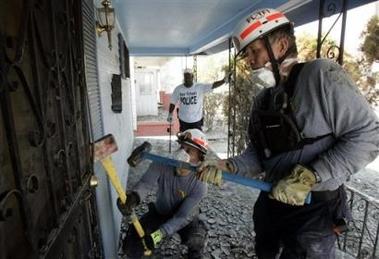
September 22, 2005 6:02 p.m. EST
Andrea Moore - All Headline News Staff Reporter
New Orleans, LA (AHN) - Searchers in Louisiana are smashing-in doors throughout the New Orleans area looking for remains of residents trapped by Hurrican Katrina.
So far, the death count has risen to 1,036 and will likely rise even more. Officials are not speculating on what the final tally might be. They say the search effort may last up to six more weeks.
About 500 individuals are involved in the search of locked homes during the third and most intense phase of the recovery effort.
Previously, those involved in the effort were only entering homes if they saw a body or heard someone inside. Now, even a high water mark on the side of a home is enough to prompt entry, sometimes using a sledgehammer, as searchers wearing special masks work to recover bodies
Link Here
Democrats criticize US accounting of Katrina money
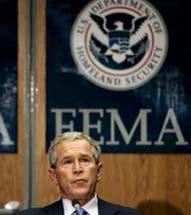
23 Sep 2005 21:31:39 GMT
Source: Reuters
WASHINGTON, Sept 23 (Reuters) - The Bush administration has failed to provide enough details on how billions of dollars in emergency funds for Gulf Coast states hit by Hurricane Katrina were being spent, a senior Democrat in the U.S. House of Representatives said on Friday.
"We asked for specific information on how they (FEMA) are awarding contracts and who contracts are going to," said Rep. David Obey of Wisconsin, the senior Democrat on the House Appropriations Committee.
"Instead of telling us who is doing what and how, we got a few spreadsheets."
The information provided by the administration lists broad allocations of funds for a range of government programs, such as $2.3 billion for "housing assistance," $3.1 billion for "missions" under a category called "operations," and $3.5 billion for "missions" under a category called "administration of field operations."
Congress has approved $62.3 billion in emergency aid to Louisiana, Mississippi, Alabama and other Gulf Coast states following the late August destruction by Hurricane Katrina. The White House is expected to ask for more money soon.
The post-hurricane funds are dwarfing the $43.9 billion the government shelled out following the Sept. 11, 2001, attacks.
Under the law providing the disaster funds, the Bush administration must provide Congress with weekly updates on the pace of spending.
The latest report, sent to Congress on Thursday, indicated that nearly $16 billion had been allocated by FEMA, the agency in charge of most of the rescue and clean-up effort.
The Army Corps of Engineers, which received $400 million in additional funds from Congress, reported that it expects "nearly all of the funds to be allocated by next week."
Spokesmen at the Department of Homeland Security were not available for comment.
The Bush administration came under intense criticism in the days after Hurricane Katrina for what was perceived as a slow emergency response.
Since then, congressional lawmakers have argued over the best way to investigate the federal government's disaster response and the most effective way to make sure emergency funds were not wasted.
Besides asking for details on the awarding of contracts, Obey and Sen. Robert Byrd of West Virginia, the Senate Appropriations Committee senior Democrat, have asked for details on credit card purchases by government officials
Link Here
New Orleans: Prisoners Abandoned to Floodwaters!!!!!!Many had not even been brought before a judge and charged, much less been convicted.
22 Sep 2005 18:15:21 GMT
Source: Human Rights Watch
(New York, September 22, 2005)-As Hurricane Katrina began pounding New Orleans, the sheriff's department abandoned hundreds of inmates imprisoned in the city's jail, Human Rights Watch said today. Inmates in Templeman III, one of several buildings in the Orleans Parish Prison compound, reported that as of Monday, August 29, there were no correctional officers in the building, which held more than 600 inmates. These inmates, including some who were locked in ground-floor cells, were not evacuated until Thursday, September 1, four days after flood waters in the jail had reached chest-level.
"Of all the nightmares during Hurricane Katrina, this must be one of the worst," said Corinne Carey, researcher from Human Rights Watch. "Prisoners were abandoned in their cells without food or water for days as floodwaters rose toward the ceiling."
Human Rights Watch called on the U.S. Department of Justice to conduct an investigation into the conduct of the Orleans Sheriff's Department, which runs the jail, and to establish the fate of the prisoners who had been locked in the jail. The Louisiana Department of Public Safety and Corrections, which oversaw the evacuation, and the Orleans Sheriff's Department should account for the 517 inmates who are missing from list of people evacuated from the jail.
Carey spent five days in Louisiana, conducting dozens of interviews with inmates evacuated from Orleans Parish Prison, correctional officers, state officials, lawyers and their investigators who had interviewed more than 1,000 inmates evacuated from the prison.
The sheriff of Orleans Parish, Marlin N. Gusman, did not call for help in evacuating the prison until midnight on Monday, August 29, a state Department of Corrections and Public Safety spokeswoman told Human Rights Watch. Other parish prisons, she said, had called for help on the previous Saturday and Sunday. The evacuation of Orleans Parish Prison was not completed until Friday, September 2.
According to officers who worked at two of the jail buildings, Templeman 1 and 2, they began to evacuate prisoners from those buildings on Tuesday, August 30, when the floodwaters reached chest level inside. These prisoners were taken by boat to the Broad Street overpass bridge, and ultimately transported to correctional facilities outside New Orleans.
But at Templeman III, which housed about 600 inmates, there was no prison staff to help the prisoners. Inmates interviewed by Human Rights Watch varied about when they last remember seeing guards at the facility, but they all insisted that there were no correctional officers in the facility on Monday, August 29. A spokeswoman for the Orleans parish sheriff's department told Human Rights Watch she did not know whether the officers at Templeman III had left the building before the evacuation.
According to inmates interviewed by Human Rights Watch, they had no food or water from the inmate's last meal over the weekend of August 27-28 until they were evacuated on Thursday, September 1. By Monday, August 29, the generators had died, leaving them without lights and sealed in without air circulation. The toilets backed up, creating an unbearable stench.
"They left us to die there," Dan Bright, an Orleans Parish Prison inmate told Human Rights Watch at Rapides Parish Prison, where he was sent after the evacuation.
As the water began rising on the first floor, prisoners became anxious and then desperate. Some of the inmates were able to force open their cell doors, helped by inmates held in the common area. All of them, however, remained trapped in the locked facility.
"The water started rising, it was getting to here," said Earrand Kelly, an inmate from Templeman III, as he pointed at his neck. "We was calling down to the guys in the cells under us, talking to them every couple of minutes. They were crying, they were scared. The one that I was cool with, he was saying 'I'm scared. I feel like I'm about to drown.' He was crying."
Some inmates from Templeman III have said they saw bodies floating in the floodwaters as they were evacuated from the prison. A number of inmates told Human Rights Watch that they were not able to get everyone out from their cells.
Inmates broke jail windows to let air in. They also set fire to blankets and shirts and hung them out of the windows to let people know they were still in the facility. Apparently at least a dozen inmates jumped out of the windows. "We started to see people in T3 hangin' shirts on fire out the windows,"
Brooke Moss, an Orleans Parish Prison officer told Human Rights Watch. "They were wavin' em. Then we saw them jumping out of the windows . . . Later on, we saw a sign, I think somebody wrote 'help' on it." As of yesterday, signs reading "Help Us," and "One Man Down," could still be seen hanging from a window in the third floor of Templeman III.
Several corrections officers told Human Rights Watch there was no evacuation plan for the prison, even though the facility had been evacuated during floods in the 1990s.
"It was complete chaos," said a corrections officer with more than 30 years of service at Orleans Parish Prison. When asked what he thought happened to the inmates in Templeman III, he shook his head and said: "Ain't no tellin' what happened to those people."
"At best, the inmates were left to fend for themselves," said Carey. "At worst, some may have died."
Human Rights Watch was not able to speak directly with Orleans Parish Sheriff Marlin N. Gussman or the ranking official in charge of Templeman III. A spokeswoman for the sheriff's department told Human Rights Watch that search-and-rescue teams had gone to the prison and she insisted that "nobody drowned, nobody was left behind."
Human Rights Watch compared an official list of all inmates held at Orleans Parish Prison immediately prior to the hurricane with the most recent list of the evacuated inmates compiled by the state Department of Corrections and Public Safety (which was entitled, "All Offenders Evacuated"). However, the list did not include 517 inmates from the jail, including 130 from Templeman III.
Many of the men held at jail had been arrested for offenses like criminal trespass, public drunkenness or disorderly conduct. Many had not even been brought before a judge and charged, much less been convicted.
Link Here
Source: Human Rights Watch
(New York, September 22, 2005)-As Hurricane Katrina began pounding New Orleans, the sheriff's department abandoned hundreds of inmates imprisoned in the city's jail, Human Rights Watch said today. Inmates in Templeman III, one of several buildings in the Orleans Parish Prison compound, reported that as of Monday, August 29, there were no correctional officers in the building, which held more than 600 inmates. These inmates, including some who were locked in ground-floor cells, were not evacuated until Thursday, September 1, four days after flood waters in the jail had reached chest-level.
"Of all the nightmares during Hurricane Katrina, this must be one of the worst," said Corinne Carey, researcher from Human Rights Watch. "Prisoners were abandoned in their cells without food or water for days as floodwaters rose toward the ceiling."
Human Rights Watch called on the U.S. Department of Justice to conduct an investigation into the conduct of the Orleans Sheriff's Department, which runs the jail, and to establish the fate of the prisoners who had been locked in the jail. The Louisiana Department of Public Safety and Corrections, which oversaw the evacuation, and the Orleans Sheriff's Department should account for the 517 inmates who are missing from list of people evacuated from the jail.
Carey spent five days in Louisiana, conducting dozens of interviews with inmates evacuated from Orleans Parish Prison, correctional officers, state officials, lawyers and their investigators who had interviewed more than 1,000 inmates evacuated from the prison.
The sheriff of Orleans Parish, Marlin N. Gusman, did not call for help in evacuating the prison until midnight on Monday, August 29, a state Department of Corrections and Public Safety spokeswoman told Human Rights Watch. Other parish prisons, she said, had called for help on the previous Saturday and Sunday. The evacuation of Orleans Parish Prison was not completed until Friday, September 2.
According to officers who worked at two of the jail buildings, Templeman 1 and 2, they began to evacuate prisoners from those buildings on Tuesday, August 30, when the floodwaters reached chest level inside. These prisoners were taken by boat to the Broad Street overpass bridge, and ultimately transported to correctional facilities outside New Orleans.
But at Templeman III, which housed about 600 inmates, there was no prison staff to help the prisoners. Inmates interviewed by Human Rights Watch varied about when they last remember seeing guards at the facility, but they all insisted that there were no correctional officers in the facility on Monday, August 29. A spokeswoman for the Orleans parish sheriff's department told Human Rights Watch she did not know whether the officers at Templeman III had left the building before the evacuation.
According to inmates interviewed by Human Rights Watch, they had no food or water from the inmate's last meal over the weekend of August 27-28 until they were evacuated on Thursday, September 1. By Monday, August 29, the generators had died, leaving them without lights and sealed in without air circulation. The toilets backed up, creating an unbearable stench.
"They left us to die there," Dan Bright, an Orleans Parish Prison inmate told Human Rights Watch at Rapides Parish Prison, where he was sent after the evacuation.
As the water began rising on the first floor, prisoners became anxious and then desperate. Some of the inmates were able to force open their cell doors, helped by inmates held in the common area. All of them, however, remained trapped in the locked facility.
"The water started rising, it was getting to here," said Earrand Kelly, an inmate from Templeman III, as he pointed at his neck. "We was calling down to the guys in the cells under us, talking to them every couple of minutes. They were crying, they were scared. The one that I was cool with, he was saying 'I'm scared. I feel like I'm about to drown.' He was crying."
Some inmates from Templeman III have said they saw bodies floating in the floodwaters as they were evacuated from the prison. A number of inmates told Human Rights Watch that they were not able to get everyone out from their cells.
Inmates broke jail windows to let air in. They also set fire to blankets and shirts and hung them out of the windows to let people know they were still in the facility. Apparently at least a dozen inmates jumped out of the windows. "We started to see people in T3 hangin' shirts on fire out the windows,"
Brooke Moss, an Orleans Parish Prison officer told Human Rights Watch. "They were wavin' em. Then we saw them jumping out of the windows . . . Later on, we saw a sign, I think somebody wrote 'help' on it." As of yesterday, signs reading "Help Us," and "One Man Down," could still be seen hanging from a window in the third floor of Templeman III.
Several corrections officers told Human Rights Watch there was no evacuation plan for the prison, even though the facility had been evacuated during floods in the 1990s.
"It was complete chaos," said a corrections officer with more than 30 years of service at Orleans Parish Prison. When asked what he thought happened to the inmates in Templeman III, he shook his head and said: "Ain't no tellin' what happened to those people."
"At best, the inmates were left to fend for themselves," said Carey. "At worst, some may have died."
Human Rights Watch was not able to speak directly with Orleans Parish Sheriff Marlin N. Gussman or the ranking official in charge of Templeman III. A spokeswoman for the sheriff's department told Human Rights Watch that search-and-rescue teams had gone to the prison and she insisted that "nobody drowned, nobody was left behind."
Human Rights Watch compared an official list of all inmates held at Orleans Parish Prison immediately prior to the hurricane with the most recent list of the evacuated inmates compiled by the state Department of Corrections and Public Safety (which was entitled, "All Offenders Evacuated"). However, the list did not include 517 inmates from the jail, including 130 from Templeman III.
Many of the men held at jail had been arrested for offenses like criminal trespass, public drunkenness or disorderly conduct. Many had not even been brought before a judge and charged, much less been convicted.
Link Here
Pentagon extends Iraq duty for 9,400 soldiers

By Will Dunham
Fri Sep 23, 1:21 PM ET
The Pentagon said on Friday 9,400 U.S. soldiers have been ordered to stay in Iraq beyond their promised yearlong duty to avoid the disruption of a troop rotation during national elections slated for December.
The soldiers will be kept seven to 10 days beyond their previously scheduled departure, Pentagon spokesman Bryan Whitman said. The Pentagon has promised Army personnel tours of duty of no longer than a year in Iraq, while Marine Corps troops serve seven-month stints.
Defense Secretary Donald Rumsfeld approved the extensions on Thursday, Whitman said.
U.S. troops have complained in the past about having their tours of duty in Iraq extended beyond promised departure dates, and Army surveys have shown that this lack of predictability in tour lengths had inflicted emotional stress on many soldiers and harmed morale.
The upcoming extensions, however, are shorter than those experienced by troops whose tours were extended during the transfer of sovereignty in June 2004 and January's parliamentary elections.
The 9,400 soldiers all had been scheduled to leave in mid-January. Extending their tours will allow commanders to postpone the transition period with the units replacing them until after the elections take place in a bid to maintain cohesion in the U.S. force, the Pentagon said.
Weeks before leaving Iraq, soldiers in a departing unit concentrate their efforts on preparing an arriving unit for the task it will assume.
"It's really to maintain stability of the U.S. forces during the Iraqi national elections," Whitman said.
TROOP LEVELS INCREASING
The United States has 147,000 troops in Iraq, about 9,000 over the recent average of about 138,000, in part because of an ongoing troop rotation and because the Pentagon has increased the force level in anticipation of an upswing in insurgent violence ahead of two political milestones.
A national referendum is slated for October 15 on a new Iraqi constitution. If voters approve it, they then would be scheduled to elect a new government on December 15.
About 4,000 soldiers from the 1st Brigade of the 3rd Infantry Division, based at Fort Stewart, Georgia, had been slated to leave Iraq on January 10 and now will be kept through January 20, Whitman said. About 5,000 soldiers from the 3rd Brigade of the 3rd Infantry Division had been slated to leave on January 19 and will be kept through January 26, Whitman said..
Both brigades are operating in north-central Iraq.
Another 400 soldiers from the 18th Airborne Corps headquarters, based at Fort Bragg, North Carolina, will be held over from their scheduled departure date of January 23 until February 2, Whitman said.
Whitman described the upcoming extensions as "very modest," although he acknowledged it meant these soldiers will stay longer than the one year they were promised.
"It's very much the goal of the department to keep these deployments to 12 months," Whitman said.
He noted that the fact that a decision on this extension went all the way up through the chain of the command to Rumsfeld reflected the seriousness of the Pentagon's commitment to keep predictability in tour lengths.
Pentagon officials previously said the U.S. force could approach the level of 159,000 present during January's elections, but a senior commander recently said he did not expect such a large increase. Whitman said he did not know how big the U.S. force will be for the upcoming election period.
Link Here
Frist asked a trustee to sell all his HCA stock in June, near a 52-week stock price peak of $58.40 and at the same time HCA insiders were selling off
HCA Subpoenaed, May Involve Frist Sales
By JONATHAN M. KATZ,
Associated Press Writer
Fri Sep 23, 9:59 AM ET
Link here
WASHINGTON - Hospital operator HCA Inc. said Friday that federal prosecutors have issued a subpoena for documents the company believes may be related to the sale of its stock by Senate Majority Leader Bill Frist.
A release from the Nashville-based company said the subpoena came from the U.S. attorney for the Southern District of New York.
The Securities and Exchange Commission also contacted Frist this week about the sales, said Frist spokesman Bob Stevenson.
"Not surprisingly, the Securities and Exchange Commission contacted Senator Frist's office after the story appeared in the press about the sale of his Hospital Corporation of America stock," Stevenson said. "The majority leader will provide the SEC any information that it needs with respect to this matter."
Frist traded using only public information, and only to eliminate the appearance of a conflict of interest, his spokesman added.
Stevenson couldn't immediately be reached for further comment. An HCA spokesman also wasn't immediately available for comment.
HCA, the nation's largest for-profit hospital company, was founded by Frist's father and his brother was formerly its CEO and chairman and remains on the board of directors.
Frist asked a trustee to sell all his HCA stock in June, near a 52-week stock price peak of $58.40 and at the same time HCA insiders were selling off shares. Reports to the Securities and Exchange Commission showed insiders sold about 2.3 million shares, worth about $112 million, from January through June, said Mark LoPresti of Thomson Financial.
The sale came about two weeks before the company issued a disappointing earnings forecast that drove its stock price down almost 16 percent by mid-July. They still have not recovered, closing Thursday at $45.90.
The value of Frist's stock at the time of the sale was not disclosed. Earlier this year, he reported holding blind trusts valued at $7 million to $35 million.
The sale of stock was first reported Monday by Congressional Quarterly. On Tuesday, the Associated Press reported that the stock was sold at or near its peak between June 13, when Frist asked the shares to be sold, and July 1, when he was told the sale was complete. On July 8 he was informed that his wife and children's shares had also been sold as per his request, his spokeswoman Amy Call said.
For years, Frist was criticized for holding HCA stock while directing legislation on Medicare reform and patient issues. His office has consistently deflected criticism by noting that his assets were in a blind trust and not under his active control.
Frist, a Tennessee Republican, is widely considered a potential presidential candidate in 2008.
HCA said the subpoena seeks the "production of documents," and said it plans to fully cooperate with the district attorney's investigation.
On Thursday, SEC spokesman John Nester would neither confirm nor deny that Frist or any officer or director of HCA is the subject of an investigation, citing the agency's policy.
Shares of HCA fell 20 cents to $45.70 in premarket trading on the New York Stock Exchange.
By JONATHAN M. KATZ,
Associated Press Writer
Fri Sep 23, 9:59 AM ET
Link here
WASHINGTON - Hospital operator HCA Inc. said Friday that federal prosecutors have issued a subpoena for documents the company believes may be related to the sale of its stock by Senate Majority Leader Bill Frist.
A release from the Nashville-based company said the subpoena came from the U.S. attorney for the Southern District of New York.
The Securities and Exchange Commission also contacted Frist this week about the sales, said Frist spokesman Bob Stevenson.
"Not surprisingly, the Securities and Exchange Commission contacted Senator Frist's office after the story appeared in the press about the sale of his Hospital Corporation of America stock," Stevenson said. "The majority leader will provide the SEC any information that it needs with respect to this matter."
Frist traded using only public information, and only to eliminate the appearance of a conflict of interest, his spokesman added.
Stevenson couldn't immediately be reached for further comment. An HCA spokesman also wasn't immediately available for comment.
HCA, the nation's largest for-profit hospital company, was founded by Frist's father and his brother was formerly its CEO and chairman and remains on the board of directors.
Frist asked a trustee to sell all his HCA stock in June, near a 52-week stock price peak of $58.40 and at the same time HCA insiders were selling off shares. Reports to the Securities and Exchange Commission showed insiders sold about 2.3 million shares, worth about $112 million, from January through June, said Mark LoPresti of Thomson Financial.
The sale came about two weeks before the company issued a disappointing earnings forecast that drove its stock price down almost 16 percent by mid-July. They still have not recovered, closing Thursday at $45.90.
The value of Frist's stock at the time of the sale was not disclosed. Earlier this year, he reported holding blind trusts valued at $7 million to $35 million.
The sale of stock was first reported Monday by Congressional Quarterly. On Tuesday, the Associated Press reported that the stock was sold at or near its peak between June 13, when Frist asked the shares to be sold, and July 1, when he was told the sale was complete. On July 8 he was informed that his wife and children's shares had also been sold as per his request, his spokeswoman Amy Call said.
For years, Frist was criticized for holding HCA stock while directing legislation on Medicare reform and patient issues. His office has consistently deflected criticism by noting that his assets were in a blind trust and not under his active control.
Frist, a Tennessee Republican, is widely considered a potential presidential candidate in 2008.
HCA said the subpoena seeks the "production of documents," and said it plans to fully cooperate with the district attorney's investigation.
On Thursday, SEC spokesman John Nester would neither confirm nor deny that Frist or any officer or director of HCA is the subject of an investigation, citing the agency's policy.
Shares of HCA fell 20 cents to $45.70 in premarket trading on the New York Stock Exchange.
WHAT IN THE HELL IS GOING ON IN IRAQ???
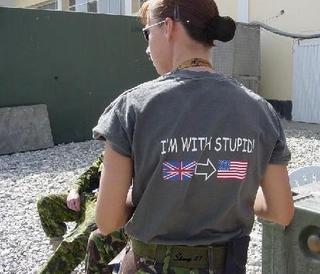
Caught red-handed
Nafeez Ahmed
BRITISH UNDERCOVER OPERATIVES IN IRAQ
Link Here
Zarqawi Eat Your Heart Out
Basra is relatively stable compared to central Iraq where violence involving insurgents, civilians and coalition forces is a daily routine. The city has rarely been a site of clashes between insurgents and coalition troops, nor is it a victim of regular terrorist attacks. This week, however, things changed, but not thanks to Zarqawi and his al-Qaeda ilk.
On Monday, two British soldiers were arrested and detained by Iraqi police in Basra. Within a matter of hours, the British military responded with overwhelming force, despite subsequent denials by the Ministry of Defence, which insisted that the two men had been retrieved solely through "negotiations."
British military officials, including Brigadier John Lorimer, told BBC News (9/20/05) that the British Army had stormed an Iraqi police station to locate the detainees. Ministry of Defence sources confirmed that "British vehicles" had attempted to "maintain a cordon" outside the police station.
After British Army tanks "flattened the wall" of the station, UK troops "broke into the police station to confirm the men were not there" and then "staged a rescue from a house in Basra", according a commanding officer familiar with the operation. Both men, British defence sources told the BBC's Richard Galpin in Baghdad, were "members of the SAS elite special forces." After their arrest, the soldiers were over to the local militia.
What had prompted this bizarre turn of events? Why had the Iraqi police forces, which normally work in close cooperation with coalition military forces, arrested two British SAS soldiers, and then handed them over to the local militia? A review of the initial on-the-ground reports leads to a clearer picture.
Fancy Dress and Big Guns Don't Mix
According to the BBC's Galpin, reporting for BBC Radio 4 (9/20/05, 18 hrs news script), Iraqi police sources in Basra told the BBC the "two British men were arrested after failing to stop at a checkpoint. There was an exchange of gunfire. The men were wearing traditional Arab clothing, and when the police eventually stopped them, they said they found explosives and weapons in their car…It's widely believed the two British servicemen were operating undercover."
Undercover? Dressed as Arabs? What were they trying to do that had caught the attention of their colleagues, the Iraqi police?
According to the Washington Post (9/20/05), "Iraqi security officials on Monday variously accused the two Britons they detained of shooting at Iraqi forces or trying to plant explosives." Reuters (9/19/05) cited police, local officials and other witnesses who confirmed that "the two undercover soldiers were arrested after opening fire on Iraqi police who approached them." Officials said that "the men were wearing traditional Arab headscarves and sitting in an unmarked car."
According to Mohammed al-Abadi, an official in the Basra governorate, “A policeman approached them and then one of these guys fired at him. Then the police managed to capture them.”
Booby-trapped Brits?
In an interview with Al Jazeerah TV, the popular Iraqi leader Fattah al-Sheikh, a member of the Iraqi National Assembly and deputy official in the Basra governorate, said that police had "caught two non-Iraqis, who seem to be Britons and were in a car of the Cressida type. It was a booby-trapped car laden with ammunition and was meant to explode in the centre of the city of Basra in the popular market." Contrary to British authorities' claims that the soldiers had been immediately handed to local militia, al-Sheikh confirmed that they were "at the Intelligence Department in Basra, and they were held by the National Guard force, but the British occupation forces are still surrounding this department in an attempt to absolve them of the crime."
The Special Reconnaissance Regiment and British Covert Operations
British defence sources told the Scotsman (9/20/05) that the soldiers were part of an "undercover special forces detachment" set up this year to "bridge the intelligence void” in Basra, drawing on 'special forces' experience in Northern Ireland and Aden, where British troops went 'deep' undercover in local communities to try to break the code of silence against foreign forces."
These elite forces operate under the Special Reconnaissance Regiment and were formed last year by then defence secretary, Geoff Hoon, "to gather human intelligence during counter-terrorist missions."
The question, of course, is how does firing at Iraqi police while dressed as Arabs and carrying explosives constitute "countering terrorism" or even gathering "intelligence"?
The admission by British defence officials is revealing. A glance at the Special Reconnaissance Regiment gives a more concrete idea of the sort of operations these two British soldiers were involved in.
The Regiment, formed recently, is "modelled on an undercover unit that operated in Northern Ireland" according to Whitehall sources. The Regiment had "absorbed the 14th Intelligence Company, known as '14 Int,' a plainclothes unit set up to gather intelligence covertly on suspect terrorists in Northern Ireland. Its recruits are trained by the SAS."
This is the same Regiment that was involved in the unlawful July 22 execution - multiple head-shots - of the innocent Brazilian, Mr. Jean Charles de Menezes, after he boarded a tube train in Stockwell Underground station.
According to Detective Sergeant Nicholas Benwell, member of the Scotland Yard team that had been investigating the activities of an ultra-secret wing of British military intelligence, the Force Research Unit (FRU), the team found that "military intelligence was colluding with terrorists to help them kill so-called 'legitimate targets' such as active republicans... many of the victims of these government-backed hit squads were innocent civilians."
Benwell's revelations were corroborated in detail by British double agent Kevin Fulton, who was recruited to the FRU in 1981, when he began to infiltrate the ranks of IRA. In his role as a British FRU agent inside the IRA, he was told by his military intelligence handlers to "do anything" to win the confidence of the terrorist group.
"I mixed explosive and I helped develop new types of bombs," he told Scotland's Sunday Herald (6/23/02). "I moved weapons… if you ask me if the materials I handled killed anyone, then I will have to say that some of the things I helped develop did kill… my handlers knew everything I did. I was never told not to do something that was discussed. How can you pretend to be a terrorist and not act like one? You can't. You’ve got to do what they do… They did a lot of murders… I broke the law seven days a week and my handlers knew that. They knew that I was making bombs and giving them to other members of the IRA and they did nothing about it… The idea was that the only way to beat the enemy was to penetrate the enemy and be the enemy."
Most startlingly, Fulton said that his handlers told him his operations were "sanctioned right at the top… this goes the whole way to the Prime Minister. The Prime Minister knows what you are doing."
Zarqawi, Ba'athists and the Seeds of Discord
So, based on the methodology of their Regiment, the two British SAS operatives were in Iraq to "penetrate the enemy and be the enemy," in order of course to "beat the enemy." Instead of beating the enemy, however, they ended up fomenting massive chaos and killing innocent people, a familiar pattern for critical students of the British role in the Northern Ireland conflict.
In November 2004, a joint statement was released on several Islamist websites on behalf of al-Qaeda's man in Iraq, Abu Musab al-Zarqawi, and Saddam Hussein's old Ba'ath Party loyalists. Zarqawi’s network had "joined other extremist Islamists and Saddam Hussein's old Baath party to threaten increased attacks on US-led forces." Zarqawi's group said they signed "the statement written by the Iraqi Baath party, not because we support the party or Saddam, but because it expresses the demands of resistance groups in Iraq."
The statement formalized what had been known for a year already – that, as post-Saddam Iraqi intelligence and US military officials told the London Times (8/9/2003), "Al Qaeda terrorists who have infiltrated Iraq from Saudi Arabia and other Arab countries have formed an alliance with former intelligence agents of Saddam Hussein to fight their common enemy, the American forces." Al Qaeda leaders "recruit from the pool" of Saddam's former "security and intelligence officers who are unemployed and embittered by their loss of status." After vetting, "they begin Al-Qaeda-style training, such as how to make remote-controlled bombs."
Yet Pakistani military sources revealed in February 2005 that the US has "resolved to arm small militias backed by US troops and entrenched in the population," consisting of "former members of the Ba'ath Party" – the same people already teamed up with Zarqawi's al-Qaeda network.
In a highly clandestine operation, the US procured “Pakistan-manufactured weapons, including rifles, rocket-propelled grenade launchers, ammunition, rockets and other light weaponry.” A Pakistani military analyst noted that the “arms could not be destined for the Iraqi security forces because US arms would be given to them.” Rather, the US is playing a double-game to “head off” the threat of a “Shi’ite clergy-driven religious movement” – in other words, to exacerbate the deterioration of security by penetrating, manipulating and arming the terrorist insurgency.
What could be the end-game of such a covert strategy? The view on-the-ground in Iraq, among both Sunnis and Shi'ites, is worth noting. Sheikh Jawad al-Kalesi, the Shi'ite Imam of the al-Kadhimiyah mosque in Baghdad, told Le Monde: "I don’t think that Abu Musab al-Zarqawi exists as such. He’s simply an invention by the occupiers to divide the people."
Iraq’s most powerful Sunni Arab religious authority, the Association of Muslim Scholars, concurs, condemning the call to arms against Shi’ites as a “very dangerous” phenomenon that “plays into the hands of the occupier who wants to split up the country and spark a sectarian war.” In colonial terms, the strategy is known as “divide and rule.”
Whether or not Zarqawi can be said to exist, it is indeed difficult to avoid the conclusion that this interpretation is plausible. It seems the only ones who don’t understand the clandestine dynamics of Anglo-American covert strategy in Iraq are we, the people, in the west. It’s high time we got informed.
UN Human Rights Body to Scrutinize US Abuses

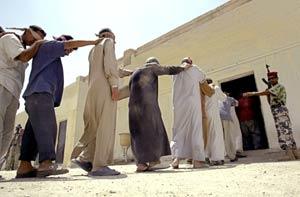
By Thalif Deen
Inter Press Service
Wednesday 21 September 2005
United Nations - The UN Human Rights Committee, scheduled to meet in Geneva next month, has written to non-governmental organizations (NGOs) calling for any available evidence of human rights abuses by the United States - particularly in the aftermath of its global war on terrorism.
The 18-member committee, comprising of independent human rights experts, will take up "issues of specific concerns relating to the effect of measures taken (by the administration of President George W. Bush) in the fight against terrorism following the events of 11 September 2001," the day the United States was subject to terrorist attacks.
The primary focus will be "on the implications of the USA Patriot Act on nationals and non-nationals, as well as problems relating to the legal status and treatment of persons detained in Afghanistan, Guantánamo, Iraq and other places of detention outside the USA."
The US Congress adopted the USA Patriot Act in October 2001 in order to provide "appropriate tools required to intercept and obstruct terrorism."
But virtually all human rights organizations, both domestic and international, have criticized the Act as seriously threatening civil liberties and freedoms in the United States.
"The USA Patriot Act was destined to foster abuses, as it weakened the system of checks and balances on law enforcement while setting aside due process safeguards under the law," says Jumana Musa, advocacy director at Amnesty International USA.
Alarmingly, Musa added, the Patriot Act has inspired a proliferation of copycat laws worldwide, prompting abuses that the United States has officially pledged to counter.
"The boast that the United States is now the world's only superpower has a grim undertow in the area of human rights; no one can tell Washington what to do or not do, no matter how egregious its cruelties," says Norman Solomon, executive director of the Washington-based Institute for Public Accuracy.
"Most governments d
One Day to Go Help Cover the White House Landscape with the Message of Impeachment

Dear roselyn, FINAL PUSH!
We need your support to bring Impeachment to the White House door!
Please make a much needed contribution now for the growing costs of this demonstration - from many thousands of signs and flyers to buses to help get people to DC. Help us fill the streets with ImpeachBush banners and placards - and people!
Click here to donate.
It is no surprise that George W. Bush’s spokespersons have announced that the “President will not be in town,” when ImpeachBush and antiwar demonstrators flood the area around the White House in a sea of protest tomorrow.
Richard Nixon too used the same tactic. He claimed that he didn’t notice the 500,000 people outside of the White House during the Vietnam war because he was “watching the football game.” This sort of delusional politics didn’t save the Nixon presidency. Under the shadow of impeachment, Nixon resigned in August 1974.
With the help of thousands of volunteers, organizers and those who have made a financial contribution, this movement has come of age. On September 24 hundreds of thousands of people will be in the streets in Washington D.C., San Francisco, Los Angeles and elsewhere with a clear message: we, the people, repudiate the criminal actions of the Bush administration. Instead of basking in glory, thumping his chest and arrogantly proclaiming, “I have a mandate,” it will be the specter of impeachment that will dominate the political landscape.
Immediately following the mass protest tomorrow we will launch the September 26 National Impeachment Lobbying day. We hope that everyone joins in this easy-to-use campaign, which will allow ImpeachBush.org members to directly communicate with members of Congress to demand the immediate filing of articles of impeachment.
Help support this mass mobilization - your generous contribution right now can make a difference at this critical hour. And for those who cannot make it to the demonstration, your financial support will help amplify the message of those who can. We are also urgently requesting donations and contributions for the signs, banners, and transportation for September 24 demonstration and the newspaper ads campaign. We are a truly massive, grassroots movement and we can do all this work because of the generous contributions by people who believe that impeachment is a critical step in the defense of the Constitution. To make a contribution, please click here, where you can also find information to write a check.
Remember: if you want to volunteer with the ImpeachBush/VoteToImpeach.org contingent this Saturday you should come to the ImpeachBush.org tent on the Ellipse on the South side of the White House. That’s where you can pick up leaflets, ImpeachBush petitions and other materials. People will begin arriving as early as 8:00 am on the Ellipse/White House on buses coming from more than 200 cities. Again, if you cannot join us in Washington D.C., but would like to continue to support the effort, you can help by making a financial contribution. Click here to donate.
Sincerely,
Ramsey Clark
20 people killed as bus carrying U.S. hurricane evacuees catches fire on gridlocked highway, local TV station reports.
Ohhhhhhh Jesus
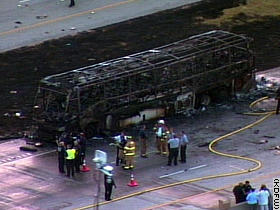
A bus catches fire and explodes on a crowded U.S. highway, killing as many as 20 people fleeing ahead of Hurricane Rita.
The bus, carrying about 45 elderly evacuees, pulled over after it burst into flames, and people were getting off when a series of explosions ripped through the bus.
DEVELOPING STORY
Link Here

A bus catches fire and explodes on a crowded U.S. highway, killing as many as 20 people fleeing ahead of Hurricane Rita.
The bus, carrying about 45 elderly evacuees, pulled over after it burst into flames, and people were getting off when a series of explosions ripped through the bus.
DEVELOPING STORY
Link Here
Agency Calls on Frist About Timing of Stock Sale

Where's Fox News? Calling Fox
news 24hr a day coverage.
Remember Martha Stewart?
By DAVID D. KIRKPATRICK
Published: September 23, 2005
WASHINGTON, Sept. 22 - A spokesman for Senator Bill Frist, Republican of Tennessee, said Thursday that the Securities and Exchange Commission had contacted Mr. Frist's office about the sale in June of his shares in HCA, the giant hospital company founded by his family.
Mr. Frist, whose brother Thomas F. Frist Jr. is chairman emeritus and the largest individual shareholder of the company, disclosed earlier this week that on June 13 he asked the managers of blind trusts controlling many of his assets to sell any of his remaining shares in HCA.
The sales occurred just as the share price reached a new peak and shortly before the company's announcement in mid-July of lower-than-expected quarterly results sent the price tumbling.
Mr. Frist, the Senate majority leader and a potential presidential candidate, initially placed more than $10 million in shares of the company in his trusts, but his spokesman said he could not determine how much remained at the time of the sale.
Mr. Stevenson, the spokesman, said the securities commission had contacted Mr. Frist after news organizations published articles this week raising questions about the profitable timing of the sale. Only a few such contacts lead to formal investigations or penalties.
"The majority leader will provide the S.E.C. any information that it needs with respect to this matter," Mr. Stevenson said. "Senator Frist had no information about the company or its performance that was not available to the public when he directed the trustees to sell the HCA stock. His only objective in selling the stock was to eliminate the appearance of a conflict of interest."
Mr. Stevenson said on Wednesday that Mr. Frist's holdings in HCA had been the subject of at least 19 news articles or public accusations about a possible conflict of interest.
Spokesmen for the S.E.C. could not be reached for comment on Thursday night; the agency customarily does not comment on its inquiries
Link Here
Saudi Minister Warns U.S. Iraq May Face Disintegration
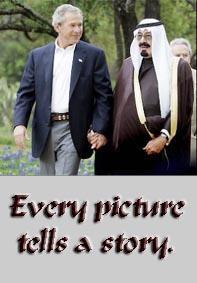
By JOEL BRINKLEY
Published: September 23, 2005
WASHINGTON, Sept. 22 - Prince Saud al-Faisal, the Saudi foreign minister, said Thursday that he had been warning the Bush administration in recent days that Iraq was hurtling toward disintegration, a development that he said could drag the region into war.
"There is no dynamic now pulling the nation together," he said in a meeting with reporters at the Saudi Embassy here. "All the dynamics are pulling the country apart." He said he was so concerned that he was carrying this message "to everyone who will listen" in the Bush administration.
Prince Saud's statements, some of the most pessimistic public comments on Iraq by a Middle Eastern leader in recent months, were in stark contrast to the generally upbeat assessments that the White House and the Pentagon have been offering.
But in an appearance at the Pentagon on Thursday, President Bush, while once again expressing long-term optimism, warned that the bloodshed in Iraq was likely to increase in the coming weeks.
"Today, our commanders made it clear," he said after a meeting on Iraq with senior military officers, "as Iraqis prepare to vote on their constitution in October and elect a permanent government in December, we must be prepared for more violence."
American commanders have repeatedly warned that insurgents would try to disrupt the voting, as they did before legislative elections in January.
Mr. Bush said that if the United States left Iraq now, it could turn into a haven for terrorists, as Afghanistan was before the fall of the Taliban.
"To leave Iraq now would be to repeat the costly mistakes of the past that led to the attacks of Sept. 11, 2001," he said.
Prince Saud, who is in Washington for meetings with administration officials, blamed several American decisions for the slide toward disintegration, though he did not refer to the Bush administration directly.
Primary among them was designating "every Sunni as a Baathist criminal," he said.
Saudi Arabia styles itself as the capital and protector of Sunni Islam, and the prince's remarks - at times harsh and at other moments careful - were emblematic of the conflicted Saudi-American relationship.
A senior administration official, reacting to Prince Saud's remarks, said, "The United States values and respects his view, and we all share a common concern for the future and stability of Iraq." He declined to be identified, under administration policy.
Prince Saud said he met with Secretary of State Condoleezza Rice last week and added that American officials generally responded to his warnings by telling him that the United States successfully carried off the Iraqi elections and "they say the same things about the constitution" and the broader situation in Iraq now. On Thursday, in fact, the senior administration official said, "The forward movement of the political process is the best answer."
Prince Saud argued: "But what I am trying do is say that unless something is done to bring Iraqis together, elections alone won't do it. A constitution alone won't do it." Prince Saud is a son of the late King Faisal and has been foreign minister for 30 years.
The prince said he served on a council of Iraq's neighboring countries - Jordan, Syria, Turkey, Iran and Kuwait as well as Saudi Arabia - "and the main worry of all the neighbors" was that the potential disintegration of Iraq into Sunni, Shiite and Kurdish states would "bring other countries in the region into the conflict."
Turkey, he noted, has long threatened to send troops into northern Iraq if the Kurds there declare independence. Iran, he asserted, is already sending money and weapons into the Shiite-controlled south of Iraq and would probably step up its relationship, should the south become independent. Saudi Arabia has long been wary of Iran's influence in the region, given that it is a Shiite theocracy.
"This is a very dangerous situation," he said, "a very threatening situation."
David E. Sanger contributed reporting for this article.
Link Here
Rita plows toward Texas, Louisiana
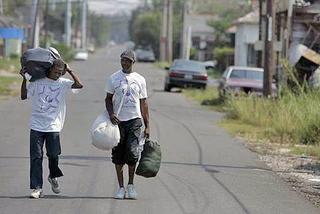

A weakened but still powerful Hurricane Rita is marching toward the Texas-Louisiana region of the U.S. Gulf Coast, with forecasters saying the storm may strengthen before making landfall early Saturday. Meanwhile, highways in Texas were crammed with cars creeping north.
Link Here
THE GALVESTON HURRICANE OF 1900
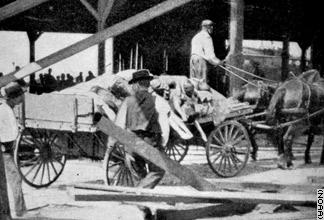
Burial at seaThere were too many victims to bury. So remains, human and animal, were loaded onto carriages to be transported to barges and then dropped into the Gulf of Mexico. Many bodies floated back to shore and were eventually burned.
 One in six deadSurvivors search through rubble for bodies. Although the actual death toll of the storm is unknown, it is estimated that between 6,000 and 12,000 people fell victim. St. Mary's Orphanage, home to 93 children and 10 Catholic nuns, was one of the first buildings claimed by the storm. The only survivors were three boys who managed to cling to an uprooted tree floating in
One in six deadSurvivors search through rubble for bodies. Although the actual death toll of the storm is unknown, it is estimated that between 6,000 and 12,000 people fell victim. St. Mary's Orphanage, home to 93 children and 10 Catholic nuns, was one of the first buildings claimed by the storm. The only survivors were three boys who managed to cling to an uprooted tree floating in
Horrible sightIsaac Cline was the U.S. Weather Bureau meteorologist in Galveston at the time of the 1900 hurricane. Cline dismissed the idea that a hurricane could reach Galveston, until the warning flags were raised at sea. By then it was too late. Later, he described the storm's aftermath as "one of the most horrible sights that ever a civilized people looked upon."

Wreckage and debris The wreckage and debris was widespread in Galveston after the storm.In 1900, the highest point in the city was less than 9 feet above sea level. The hurricane caused waves higher than 15 feet to wash over the island, smashing buildings to rubble.
Gallery: Galveston storm of 1900
Top Democrats won't attend anti-war rally in Washington
Will you be there? To march to bring your military
home.


BY STEVEN THOMMA
Knight Ridder Newspapers
Posted on Thu, Sep. 22, 2005
WASHINGTON - (KRT) - As the anti-war movement arrives in Washington this weekend, many top Democrats are leaving.
Nationally known Democratic war critics, including Howard Dean, the chairman of the Democratic National Committee, and Sens. Hillary Rodham Clinton of New York, Russell Feingold of Wisconsin and John Kerry of Massachusetts, won't attend what sponsors say will be a big anti-war rally Saturday in Washington.
The only Democratic officeholders who plan to address the rally are Reps. Cynthia McKinney of Georgia and John Conyers of Michigan.
Today's leading Democrats head a party divided over the war, and many leaders are wary of standing with anti-war activists, who represent much of the party's base. The divide between anti-war activists and Democratic leaders underscores a challenge the party faces in the 2006 congressional elections and beyond. Some activists say that Democrats such as Clinton and Kerry who criticize the war but refuse to demand a timetable for withdrawal are effectively supporting the status quo - and may not merit future support.
En route to Washington for the rally, anti-war activist Cindy Sheehan protested outside Clinton's New York office. "She knows that the war is a lie, but she is waiting for the right time to say it," Sheehan told about 500 cheering supporters. "You say it or you are losing your job."
Spokesmen for the Democrats who are skipping the anti-war event all said they had schedule conflicts. But some leading anti-war activists aren't buying it.
"There are a lot of people here who are wondering, where are the Democrats?" said Tom Andrews, a former Democratic House member from Maine who's now the national director of Win Without War, one of several groups that are organizing three days of protests against the war in Washington starting Saturday.
"The Democratic Party has an identity crisis on this issue. We need voices. We need leadership," Andrews said. "But fear is driving them."
The rally comes at a time when a growing number of Americans want a timetable for withdrawing U.S. troops from Iraq, a proposition that both President Bush and many leading Democrats reject.
A poll this week by the nonpartisan Pew Research Center found that 51 percent of Americans want to keep troops in Iraq until it's stabilized, but the ranks of those who want to set a timetable to withdraw have grown to 57 percent from 49 percent in July. (Evidently some people chose both answers.)
At the same time, a growing number of grassroots Democrats are dissatisfied with their party's leadership in Congress. The percentage of Democrats who are happy with their leaders dropped from 64 percent in May to 49 percent now, the Pew survey found.
Dean, who rallied anti-war activists with his fervent opposition to the war during his 2003-2004 presidential campaign, already was scheduled to spend the weekend meeting with the Congressional Black Caucus, spokesman Josh Earnest said.
"His views on the president's handling of the war in Iraq are well documented," Earnest said. The anti-war rally, he said, is "not something the party was involved with."
Kerry planned to be in his home state this weekend, a spokeswoman said. At Brown University on Monday, the senator ripped Bush's conduct of the war, saying the president should admit "countless" mistakes in the war and proclaiming that "real leadership stands up to special interests and sets the course for future generations."
Feingold was scheduled to be out of town, a spokesman said. Feingold is the only national Democrat weighing a 2008 presidential campaign who's endorsed setting a timetable to withdraw U.S. troops from Iraq.
Clinton also didn't plan to attend, a spokesman said.
"Our job is to make them pay a price for continuing to support this war," said Bill Dobbs, a spokesman for United for Peace and Justice, another group that's organizing the anti-war weekend in Washington.
Sixty-six members of Congress have formed an "Out of Iraq Congressional Caucus" that wants either immediate withdrawal or a timetable to withdraw. None of the party's congressional leadership and none of the likely candidates for president are members.
Anti-war organizers said they expected 100,000 people Saturday. A rival group plans a rally Sunday in Washington to show support for the war.
---
Link Here
Globe Union Sees Greed in Cuts
By Jay Fitzgerald
Boston Herald.com
Thursday 22 September 2005
The Boston Globe's employee union has issued a call to arms to protest proposed job cuts and what it calls rampant "corporate greed" on a par with "Enron" and excessive executive pay at the New York Times Co.
In a statement issued to the Herald, the president of the 1,200-member Globe newspaper union also took swings at Boston's self-described "piñata" - James Kilts, chief executive of the Gillette Co. and a recent addition to the board of directors at the Times Co., the Globe's corporate parent.
"We are certain this (staff-reduction) action has been embraced by Gillette's Jim Kilts," said Dan Totten in a statement.
In June, when the Gillette boss joined the Times board, the Globe union wrote a letter in protest saying "the appointment of Kilts raises the obvious question if he will find profits by cutting employees."
A planned employee cookout today for Globe members of the Boston Newspaper Guild will be turned into a rallying point for employees. Globe staffers are upset with Tuesday's announcement that 160 jobs will be cut within the Times' New England units, most of them at the Boston Globe, including 35 within the newspaper's newsroom.
Amid declining revenue, the Times Co. plans to slash a total of 500 jobs, or 4 percent of its work force, including 45 within The New York Times newsroom.
Globe publisher Richard Gilman hit back at the union yesterday.
"The Guild leadership is resorting to wild accusations in a manner that accomplishes nothing of value at this time," said Gilman in a statement. "We need to deal with the difficult decisions that impact our valued employees, and as always we believe it is best to discuss such matters directly with the Guild."
In his statement and a later interview with the Herald, a frustrated Totten said employees were informed of planned cutbacks through a "typical cold and insensitive manner: through e-mail."
Totten blasted the staff cutbacks at a time when Times publisher Arthur Sulzberger Jr. "takes a limousine to work that has his name emblazoned on it," and top executives take home millions in compensation.
"There is something drastically wrong," he said. "Under the circumstances, the company is not so far removed from the corporate greed that we've seen from the likes of Enron & Worldcom," both companies embroiled in past corporate scandals.
He questioned the Times' "Streamline to Grow" strategy at a time when the Times "preaches ethics and family workplace values daily."
In his criticism of the planned staff cutbacks, Totten also revealed that the union leadership bitterly opposed Kilts' inclusion on the Times' board of directors last June, amid controversy in Boston about the proposed sale of Gillette.
Kilts has since publicly blasted the city's "negative" attitude and slammed media coverage of Gillette, including the Globe's.
Link Here
Boston Herald.com
Thursday 22 September 2005
The Boston Globe's employee union has issued a call to arms to protest proposed job cuts and what it calls rampant "corporate greed" on a par with "Enron" and excessive executive pay at the New York Times Co.
In a statement issued to the Herald, the president of the 1,200-member Globe newspaper union also took swings at Boston's self-described "piñata" - James Kilts, chief executive of the Gillette Co. and a recent addition to the board of directors at the Times Co., the Globe's corporate parent.
"We are certain this (staff-reduction) action has been embraced by Gillette's Jim Kilts," said Dan Totten in a statement.
In June, when the Gillette boss joined the Times board, the Globe union wrote a letter in protest saying "the appointment of Kilts raises the obvious question if he will find profits by cutting employees."
A planned employee cookout today for Globe members of the Boston Newspaper Guild will be turned into a rallying point for employees. Globe staffers are upset with Tuesday's announcement that 160 jobs will be cut within the Times' New England units, most of them at the Boston Globe, including 35 within the newspaper's newsroom.
Amid declining revenue, the Times Co. plans to slash a total of 500 jobs, or 4 percent of its work force, including 45 within The New York Times newsroom.
Globe publisher Richard Gilman hit back at the union yesterday.
"The Guild leadership is resorting to wild accusations in a manner that accomplishes nothing of value at this time," said Gilman in a statement. "We need to deal with the difficult decisions that impact our valued employees, and as always we believe it is best to discuss such matters directly with the Guild."
In his statement and a later interview with the Herald, a frustrated Totten said employees were informed of planned cutbacks through a "typical cold and insensitive manner: through e-mail."
Totten blasted the staff cutbacks at a time when Times publisher Arthur Sulzberger Jr. "takes a limousine to work that has his name emblazoned on it," and top executives take home millions in compensation.
"There is something drastically wrong," he said. "Under the circumstances, the company is not so far removed from the corporate greed that we've seen from the likes of Enron & Worldcom," both companies embroiled in past corporate scandals.
He questioned the Times' "Streamline to Grow" strategy at a time when the Times "preaches ethics and family workplace values daily."
In his criticism of the planned staff cutbacks, Totten also revealed that the union leadership bitterly opposed Kilts' inclusion on the Times' board of directors last June, amid controversy in Boston about the proposed sale of Gillette.
Kilts has since publicly blasted the city's "negative" attitude and slammed media coverage of Gillette, including the Globe's.
Link Here
Gaming the Price of Leadership
The New York Times Editorial
Thursday 22 September 2005
Never underestimate the brazenness of incumbent politicians determined to sneak unfair rule changes into the game. Incumbent treachery is under way in the Senate, where Republicans are using a big spending bill as cover to try to gut campaign donation limits and give themselves an eight-to-one spending advantage over election challengers.
The move has the two champions of the campaign finance reform law - John McCain of Arizona and Russell Feingold of Wisconsin - livid, and demanding a showdown vote. That's the least this sorry bit of political greed deserves. Any lawmaker who supports it should be put on a watch list of those machine hacks capable of stealing hot stoves.
The plan, slipped into the transportation spending bill, would free incumbents to make unlimited "soft money" donations to the national party from their misnamed "leadership" political action committees. These are lawmakers' secondary campaign slush funds, in effect, but with a spending range limited by law until now. Under the Senate's snooker move, an incumbent's donation to the national party would be free for recycling right back through the new loophole as found money for the donor's own campaign. Allowing that would circumvent the three-year-old reform limits and establish dual campaign standards: a free and easy one for incumbents, and a tight one for challengers, barred from running "leadership" kitties. Challengers would be restricted to collecting $4,200 per person for a campaign, while a senator could collect $34,200 per donor for the same race.
The shamelessness of this ploy is underscored by its inclusion in a bill that includes some emergency money for Hurricane Katrina repairs - added cover, no doubt, in the eyes of supporters, whose first priority is political self-preservation.
Katrina is already being brandished like a scythe by House conservatives, who are determined to use the reconstruction cost as an excuse to further their age-old campaign to eliminate valuable government programs, including the public financing law that was intended to hold down the outrageously booming costs of presidential elections. If the Senate games the campaign law, the injustice can only grow in the House.
Thursday 22 September 2005
Never underestimate the brazenness of incumbent politicians determined to sneak unfair rule changes into the game. Incumbent treachery is under way in the Senate, where Republicans are using a big spending bill as cover to try to gut campaign donation limits and give themselves an eight-to-one spending advantage over election challengers.
The move has the two champions of the campaign finance reform law - John McCain of Arizona and Russell Feingold of Wisconsin - livid, and demanding a showdown vote. That's the least this sorry bit of political greed deserves. Any lawmaker who supports it should be put on a watch list of those machine hacks capable of stealing hot stoves.
The plan, slipped into the transportation spending bill, would free incumbents to make unlimited "soft money" donations to the national party from their misnamed "leadership" political action committees. These are lawmakers' secondary campaign slush funds, in effect, but with a spending range limited by law until now. Under the Senate's snooker move, an incumbent's donation to the national party would be free for recycling right back through the new loophole as found money for the donor's own campaign. Allowing that would circumvent the three-year-old reform limits and establish dual campaign standards: a free and easy one for incumbents, and a tight one for challengers, barred from running "leadership" kitties. Challengers would be restricted to collecting $4,200 per person for a campaign, while a senator could collect $34,200 per donor for the same race.
The shamelessness of this ploy is underscored by its inclusion in a bill that includes some emergency money for Hurricane Katrina repairs - added cover, no doubt, in the eyes of supporters, whose first priority is political self-preservation.
Katrina is already being brandished like a scythe by House conservatives, who are determined to use the reconstruction cost as an excuse to further their age-old campaign to eliminate valuable government programs, including the public financing law that was intended to hold down the outrageously booming costs of presidential elections. If the Senate games the campaign law, the injustice can only grow in the House.
A bridge too far
Why were stranded New Orleanians turned back by gun-wielding police from Gretna, La.?
By Clarence Page
09/21/05 "Chicago Tribune" -- -- WASHINGTON -- Among many unanswered questions in the wake of Hurricane Katrina, we have this one: Why didn't the stranded residents of flooded New Orleans simply walk to dry land? For many, the answer was simple and disturbing: The suburbs wouldn't let them.
Three long days after the hurricane hit, thousands of evacuees, mostly black, tried to march across one of the last escape routes out of the city, the Greater New Orleans Bridge. But they were turned back by gun-wielding police officers from suburban Gretna, La.
Authorities in St. Bernard Parish, La., to the east, stacked cars to block off roads from the city, according to news accounts. But Gretna's decision gained the most notoriety after two eyewitnesses, San Francisco paramedics caught in the bridge confrontation, reported it on a Socialist Worker Web site.
Internet chatter, angered by the ugly implications of a mostly white town blocking the path of mostly black evacuees, quickly spread the story as an outrageous allegory about race, bureaucratic bungling and the eternal tensions between cities and suburbs.
But, here, as with many stories about race these days, truth gets in the way of a good allegory. Mainstream media revisited the story and found another side to it. Questionable as their tactics might have been, the suburbanites were not as racially evil as they initially seemed.
Gretna's population of 17,500 is about a third black. The town has a racially integrated police force and a black City Council member. That council member joined his colleagues in passing a unanimous resolution supporting the police chief's move to block the bridge.
When the town lost power and water, like New Orleans, after Katrina struck Aug. 29, town officials turned without success to the state and to the Federal Emergency Management Agency. Yet, when thousands of evacuees fled to Gretna, the town bused more than 5,000 of them Aug. 31 to a hastily constructed food-distribution center in another suburb.
When growing crowds crossed the bridge after being stuck for days in New Orleans' Convention Center without food, water and working toilets, New Orleans officials began telling others to cross the bridge too. Gretna officials, upset at this apparent unfunded mandate imposed on them by the big city, began to feel overwhelmed, they say.
Gretna Police Chief Arthur S. Lawson Jr. proposed the blockade. Mayor Ronnie C. Harris backed him up. The result was the confrontation at the bridge, fraught with racial implications.
Whether and how race played a role at the bridge to Gretna will be argued forever. But it is safe to say that a potentially violent standoff occurred between the desperately needy and those who had tried to help , often heroically, but felt they had no more to give.
Imposing racial explanations too quickly impairs our ability to focus on other explanations that may be closer to the truth. To answer satisfactorily the burning questions of what went wrong in Gretna and elsewhere in the hurricane zone, I think we need what the Republican Congress and President Bush have been reluctant to give: an independent, bipartisan, multiracial commission similar to the commission responsible for investigating Sept. 11, 2001.
A new report by the 9/11 commission chastises the government's failure to follow its recommendations for improving communications among police, firefighters and other first-responders.
Thomas H. Kean and Lee H. Hamilton, the commission's former chairman and vice chairman respectively, called it scandalous that, for example, New Orleans' breakdown in communications led to breakdowns in law and order. The city and three neighboring parishes could not talk to each other because they were using different equipment and frequencies. Helicopter crews couldn't talk to rescuers in boats. New Orleans police and National Guard commanders in Mississippi had to use human couriers to carry messages.
An independent post-Katrina commission won't satisfy everyone. Nothing will. But it can help authorities at all levels of government avoid making the same mistakes again. No one can anticipate every disaster, but we should at least be able to respond quickly after disaster happens. Cities and suburbs have enough disputes to work out without waiting for a disaster to make things worse.
Clarence Page is a member of the Tribune's editorial board. E-mail: cptime@tribune.com
Copyright © 2005, Chicago Tribune
Link Here
By Clarence Page
09/21/05 "Chicago Tribune" -- -- WASHINGTON -- Among many unanswered questions in the wake of Hurricane Katrina, we have this one: Why didn't the stranded residents of flooded New Orleans simply walk to dry land? For many, the answer was simple and disturbing: The suburbs wouldn't let them.
Three long days after the hurricane hit, thousands of evacuees, mostly black, tried to march across one of the last escape routes out of the city, the Greater New Orleans Bridge. But they were turned back by gun-wielding police officers from suburban Gretna, La.
Authorities in St. Bernard Parish, La., to the east, stacked cars to block off roads from the city, according to news accounts. But Gretna's decision gained the most notoriety after two eyewitnesses, San Francisco paramedics caught in the bridge confrontation, reported it on a Socialist Worker Web site.
Internet chatter, angered by the ugly implications of a mostly white town blocking the path of mostly black evacuees, quickly spread the story as an outrageous allegory about race, bureaucratic bungling and the eternal tensions between cities and suburbs.
But, here, as with many stories about race these days, truth gets in the way of a good allegory. Mainstream media revisited the story and found another side to it. Questionable as their tactics might have been, the suburbanites were not as racially evil as they initially seemed.
Gretna's population of 17,500 is about a third black. The town has a racially integrated police force and a black City Council member. That council member joined his colleagues in passing a unanimous resolution supporting the police chief's move to block the bridge.
When the town lost power and water, like New Orleans, after Katrina struck Aug. 29, town officials turned without success to the state and to the Federal Emergency Management Agency. Yet, when thousands of evacuees fled to Gretna, the town bused more than 5,000 of them Aug. 31 to a hastily constructed food-distribution center in another suburb.
When growing crowds crossed the bridge after being stuck for days in New Orleans' Convention Center without food, water and working toilets, New Orleans officials began telling others to cross the bridge too. Gretna officials, upset at this apparent unfunded mandate imposed on them by the big city, began to feel overwhelmed, they say.
Gretna Police Chief Arthur S. Lawson Jr. proposed the blockade. Mayor Ronnie C. Harris backed him up. The result was the confrontation at the bridge, fraught with racial implications.
Whether and how race played a role at the bridge to Gretna will be argued forever. But it is safe to say that a potentially violent standoff occurred between the desperately needy and those who had tried to help , often heroically, but felt they had no more to give.
Imposing racial explanations too quickly impairs our ability to focus on other explanations that may be closer to the truth. To answer satisfactorily the burning questions of what went wrong in Gretna and elsewhere in the hurricane zone, I think we need what the Republican Congress and President Bush have been reluctant to give: an independent, bipartisan, multiracial commission similar to the commission responsible for investigating Sept. 11, 2001.
A new report by the 9/11 commission chastises the government's failure to follow its recommendations for improving communications among police, firefighters and other first-responders.
Thomas H. Kean and Lee H. Hamilton, the commission's former chairman and vice chairman respectively, called it scandalous that, for example, New Orleans' breakdown in communications led to breakdowns in law and order. The city and three neighboring parishes could not talk to each other because they were using different equipment and frequencies. Helicopter crews couldn't talk to rescuers in boats. New Orleans police and National Guard commanders in Mississippi had to use human couriers to carry messages.
An independent post-Katrina commission won't satisfy everyone. Nothing will. But it can help authorities at all levels of government avoid making the same mistakes again. No one can anticipate every disaster, but we should at least be able to respond quickly after disaster happens. Cities and suburbs have enough disputes to work out without waiting for a disaster to make things worse.
Clarence Page is a member of the Tribune's editorial board. E-mail: cptime@tribune.com
Copyright © 2005, Chicago Tribune
Link Here





